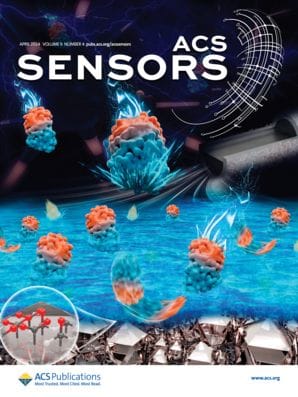Professor Ruchi Anand leads a research group in the Chemistry Department of the Indian Institute of Technology Bombay and serves on the Editorial Advisory Board of ACS Sensors. Her group’s research focuses on antibiotic resistance and biosensing applications. “Currently our labs choose protein structure as the central theme and using that we try to understand molecular […]

Professor Ruchi Anand leads a research group in the Chemistry Department of the Indian Institute of Technology Bombay and serves on the Editorial Advisory Board of ACS Sensors. Her group’s research focuses on antibiotic resistance and biosensing applications.
“Currently our labs choose protein structure as the central theme and using that we try to understand molecular mechanisms,” she said. “And we have taken up a couple of directions, but both the directions we have taken are of societal benefit.”
In biosensing, she has developed enzymes that are stable at room temperature and can specifically detect aromatic pollutants that are major xenobiotics, causing water pollution. She collaborates with chemical engineers to make the device. “The other very, very major direction of our lab is studying antibiotic resistance. Here we either look at enzymes which are new therapeutics. And see if we can come up with strategies to develop new drugs. And in the second approach, we look at the origin of resistance itself.”
From an early age, she was very interested in the stories of women scientists. She liked how Marie Curie’s husband left his own research to assist his wife with her work. Her father was a chemical engineer who worked on green lubricants for cars, and she would sometimes go to the lab with him. That’s where her interest in science began, though it took time to find the area of study that was right for her.
One of her favorite books is “The Microbe Hunters” by Paul de Kruif. But Anand decided she did not want to be a doctor, “because I’m not very good at cutting things,” she said. She got her bachelor’s and master’s degrees in chemistry. In grad school at Cornell, she had an opportunity to get more into biology and took biophysics. “I was intrigued by protein folding and protein structure.”
ACS has been her first choice for publishing, and her first paper was published in Biochemistry. She really likes that the editors are all active researchers, so they can make good choices for peer review. Her first submission to Biochemistry was rejected, but they gave reasons why it was rejected, and she used their ideas to improve her paper and following the leads she published two Biochemistry articles on the topic.
Read selected research by Professor Ruchi Anand
Evaluation of the Antiviral Potential of Halogenated Dihydrorugosaflavonoids and Molecular Modeling with nsP3 Protein of Chikungunya Virus (CHIKV)
ACS Omega 2019, 4, 23, 20335-20345
DOI: 10.1021/acsomega.9b02900F
Compositional Tailoring for Realizing High Thermoelectric Performance in Hafnium-Free n-Type ZrNiSn Half-Heusler Alloys
ACS Applied Materials & Interfaces 2019, 11, 51, 47830-47836
DOI: 10.1021/acsami.9b12599
A Novel Determinant of PSMD9 PDZ Binding Guides the Evolution of the First Generation of Super Binding Peptides
Biochemistry 2019, 58, 32, 3422-3433
DOI: 10.1021/acs.biochem.9b00308
Design of Protein-Based Biosensors for Selective Detection of Benzene Groups of Pollutants
ACS Sensors 2018, 3, 9, 1632-1638
DOI: 10.1021/acssensors.8b00190
Design of Ultrasensitive Protein Biosensor Strips for Selective Detection of Aromatic Contaminants in Environmental Wastewater
Analytical Chemistry 2018, 90, 15, 8960-8968
DOI: 10.1021/acs.analchem.8b01130
